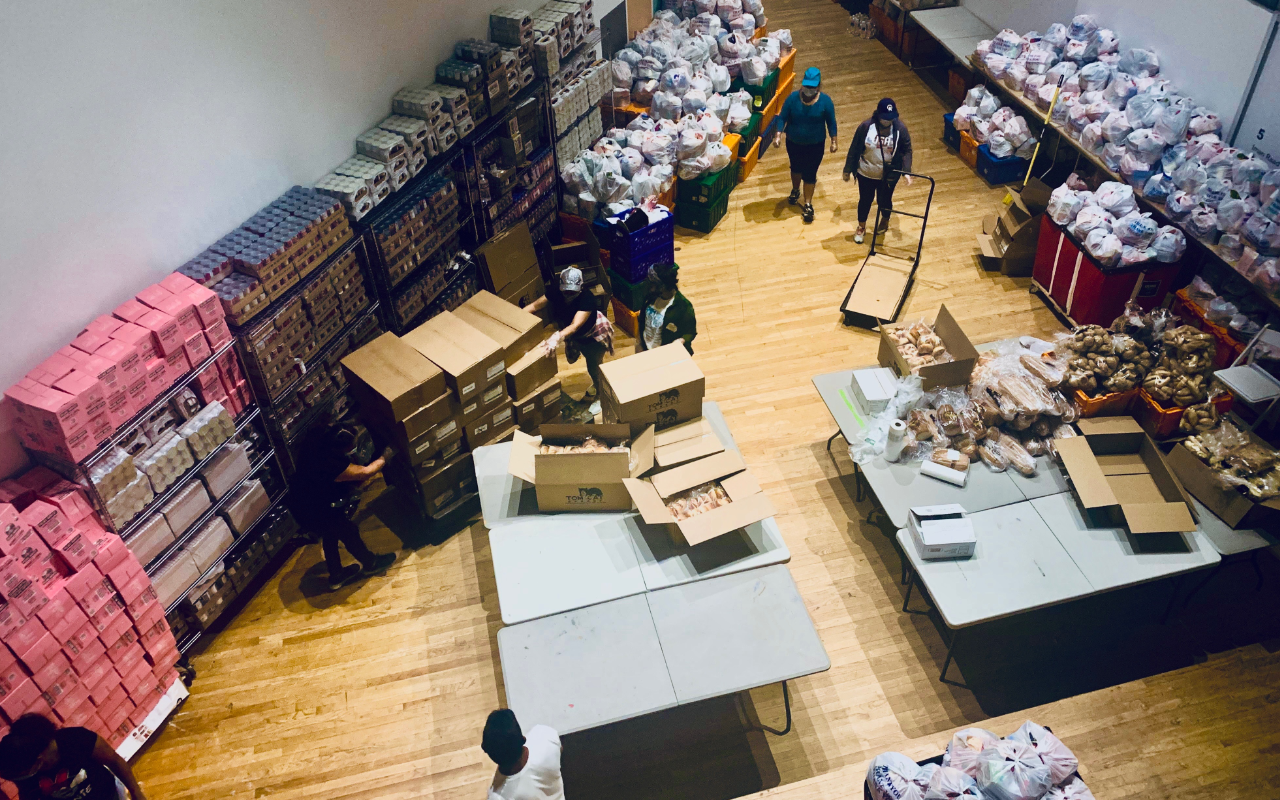
La Jornada Food Pantry at the Queens Museum, New York, 2020
Photo: Queens Museum
Tate’s ‘backward step’
Tate Exchange – the only dedicated community co-creation programme in a major museum – is to be discontinued. Stella Toonen thinks it’s a step backwards for a sector that had begun to let new voices in.
Tate Exchange was set up in 2016 to give community groups agency in shaping programmes at the museum. With dedicated spaces at Tate Modern and Tate Liverpool, it invited civic, education, health and social justice groups to take the lead in deciding the themes, questions and discussions that should be addressed in museum spaces.
Its co-creation approach, in which staff and community members equally own and contribute to projects, challenged traditional hierarchy structures in the museum and helped the collaborators develop more inclusive, diverse, engaging and relevant practices.
The decision to discontinue Tate Exchange seems largely motivated by budget cuts due to a decrease in visitor numbers during the pandemic. It comes on top of Covid-related redundancy rounds in 2020 and 2021 – in which around 430 jobs were lost across Tate and its commercial arm, Tate Enterprises.
However, the same pandemic that is making Tate’s in-person community engagement programme unviable, also seems to be highlighting the dire need for precisely such programmes. After lockdown periods of limited cultural access, many museums are keen to make new connections with their communities and, by working closely with these audiences, they often find new relevance as a result.
Local audiences embrace community initiatives
Indeed, many cultural organisations have used the Covid enforced downtime to build tighter relationships with their local neighbourhoods or to take on new social roles within their communities.
For instance, Derby Museums opened a fully equipped workshop space this spring to help local makers, giving them access to tools. And the Queens Museum in New York began running a food bank out of its building to address food injustice in the borough. Both museums prioritised community needs and found that their responses were warmly embraced by their local audiences.
The pandemic seems to have accelerated a move towards community-focused working that was already visible when Tate Exchange first opened in 2016. Already then, the project represented a wider desire within the cultural sector to create institutions that were genuinely of, by, and for all the people they serve.
Tate Exchange, being one of the largest commitments to community co-creation seen at a major museum worldwide, offered a space for experimentation of unique scale and reach. Moreover, its large network of partners helped to share its community engagement expertise across the entire cultural sector.
An active step backwards
The community co-creation approach used by Tate Exchange became even more prevalent after the Black Lives Matter protests of 2020. The events led many cultural organisations to turn to co-creation to ensure marginalised community voices were represented in their programmes.
For example, Manchester Museum strengthened its close collaboration with the local South Asian community, who are informing the design of its new South Asia gallery. Similarly, the Whitworth in Manchester and the Van Abbemuseum in the Netherlands installed diverse community boards to ensure their voices are represented in the shaping of their new Constituent Museum projects.
It seems the direction the cultural sector has been taking towards creating more community-led institutions has only been solidified by the events of the past two pandemic years. Hence, Tate’s decision to close a major avenue for community input at this precise time is a remarkable decision.
It risks becoming an active step backwards on a path; a path on which others will keep moving ahead without them. Of course, its real impact depends on what will replace the Tate Exchange platform. The current proposal for embedding its practices into existing Tate projects suggests it will not be of the same scale or reach.
Need for a dedicated project to champion cultural democratisation
Having observed the Tate Exchange project for the past three years as part of my doctoral research, I worry that the discontinuation of the programme will mean losing an immense body of highly valuable and unique learning. From my findings, I observed that the programme inspired many staff members across Tate to open up to alternative community viewpoints.
It also pushed them to question some of the traditional hierarchies embedded in museum work and to build more equitable relationships. And their change in practice seemed to be trickling down to the partners they worked with too.
It is unclear how much of that transformation will remain, without a dedicated project to champion these areas of cultural democratisation.
My research shows that professionals from across the cultural sector are increasingly recognising community co-creation as a distinct practice that needs a complex set of skills. Moreover, it shows that many arts professionals would be keen to develop those skills.
It is my hope, therefore, that Tate will find a way to ensure the legacy of the Tate Exchange platform will be available for everyone to learn from, and that it continues to commit to developing its community practices further, even if it is in a different form. It is more important than ever to prioritise community voices – we must not let Covid stand in the way.
Stella Toonen is a PhD researcher at King’s College London.
Join the Discussion
You must be logged in to post a comment.